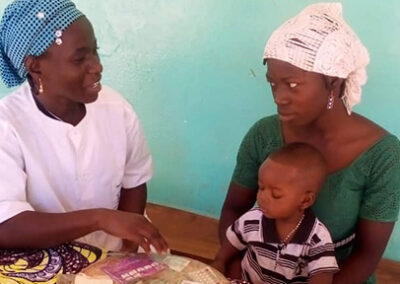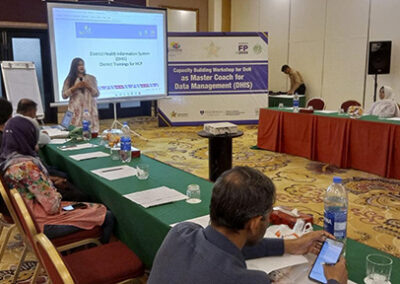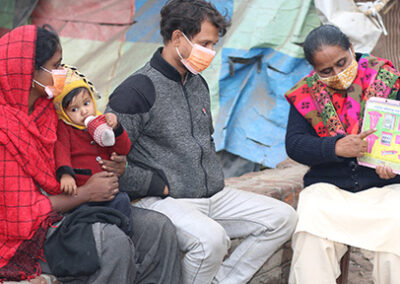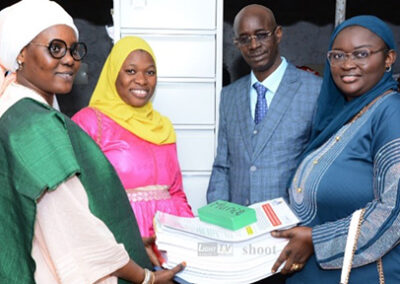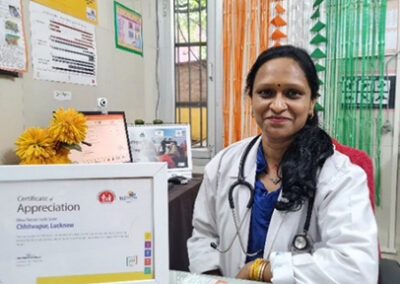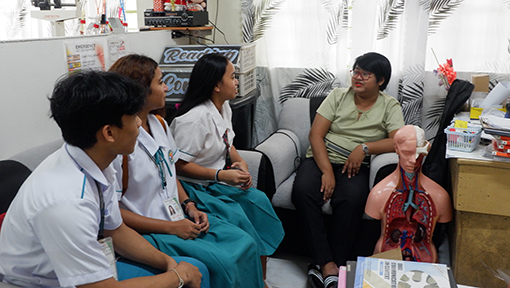 The Concepcion Pequena National High School (CPNHS) in Naga City, Philippines, established a “teen hub” for adolescent sexual and reproductive health guidance and other services in 2021, with support from the Naga City government and The Challenge Initiative (TCI).
The Concepcion Pequena National High School (CPNHS) in Naga City, Philippines, established a “teen hub” for adolescent sexual and reproductive health guidance and other services in 2021, with support from the Naga City government and The Challenge Initiative (TCI).
After CPNHS faculty member Dessa Bermejo attended a training with the TCI city leadership team and with approval from the Department of Education, she converted two offices to serve as both a school clinic and teen hub. Today, the clinic and teen hub not only offers health services, counseling and nutrition monitoring, it also functions as a non-judgmental sanctuary for adolescent students, in particular teen mothers.
Peer Educators Help Put Students At Ease
Dessa teaches Music, Arts, Physical Education and Health (MAPEH) subjects, and promotes the teen hub’s services to her students during classes. She closely observes her students and strives to be relatable to them as possible, but she felt her students weren’t completely open to sharing their thoughts with her, so peer facilitators and educators were also trained by TCI.
I have seen wonderful results: the students now come to the teen hub and get to talk with fellow teenagers about their issues and concerns.”
On typical days, students come for clinical services for ailments ranging from a headache or cough or an upset stomach. But on not-so-typical days, teens start talking while they are being treated, especially when peer educators are present in the clinic. When a peer educator sees that a particular student might need more clinical intervention, Dessa refers them to the Bicol Medical Center (BMC) Psych Ward, instead of the barangay health center. The teenagers prefer to directly go to the hospital psychiatrist because they fear that they will be the subject of gossip if they talk to the barangay health workers.
Dessa admits that barangay health workers should perhaps have more training in working with teenaged clients. Steps need to be taken to change mindsets and subsequently change negative perceptions that keep adolescents from seeking their help. Dessa further notes that as soon as students feel they are being misunderstood or judged, they distance themselves. This is particularly true for teen mothers.
Last year, we had eight cases and this year we already logged six. Two of these are 18-year-olds and are now legally married. The youngest one is 13. But we are proud to say that none of them dropped out of school.”
Under the Department of Education’s Alternative Learning System (ALS) curriculum, pregnant teens and adolescent mothers are moved to learning modules that allow them to report to school only when they can. The teachers print out learning and testing materials for the ALS students to take home and bring back for evaluation once or twice a week.
According to Dessa, most of the pregnant students only reveal their condition in the second trimester or when their class adviser has called them out for absences or tardiness. Sometimes, the parents themselves stop their children from informing their teachers. She believes fear of judgment may be the reason. In a deeply religious country such as the Philippines, moralist norms often lead to bullying and gossiping, and as pointed out earlier, these negatively impact health-seeking behavior.
A Sanctuary for Teen Mothers
One of the teenage pregnancy cases involved a 15-year-old Muslim girl. The girl had not had her period for a month and came to the clinic complaining of pain in her groin area. The clinic immediately contacted her uncle and guardian and told him that they were going to refer the girl to BMC for medical assessment. Upon hearing the symptoms and being told of the possible condition of the child, the uncle insisted that the doctor must be a woman and preferably Muslim too. But there was no doctor anywhere in the city who was both so Dessa had to convince the guardian to allow a woman doctor to handle the case discreetly. Dessa happily shares that the girl continues to study via ALS.
Lately, it seems that the hub’s reputation for being a sanctuary has taken a life of its own. According to Dessa, students now come to speak regularly to their peer educators and play games or sing songs with their guitar. Adult teachers also come to the clinic to talk about their sexual and reproductive health issues as well as mental health concerns.
We seem to have acquired the reputation to be able to answer their questions.”
It seems that the strategy to discreetly and sensitively handle cases has worked. The staff and peer educators nurture a culture of trust and openness with each student through judgment-free conversations and confidential handling of their information. They also are trained to see red flags in mental health such as possible self-harm or suicidal ideation via a self-reported checklist. After her own training with the TCI city leadership team, Dessa learned to tone down her facial expressions that might intimidate her students and be more aware of her body language and voice modulation.
Marjorie Francia Banares, the TCI city technical lead for Naga City, noted:
Our coaching in health leadership and management has yielded results at ground level, leading implementers such as Dessa to innovate and improve health service delivery not just to pregnant adolescents or teen moms,”
Onward to the Future
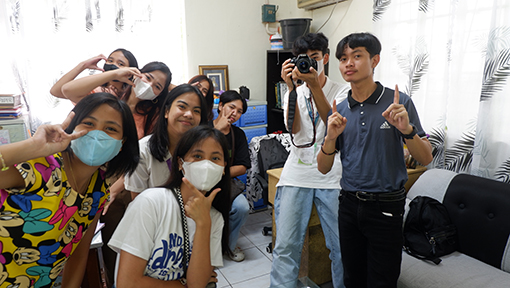 CPNHS has a population of 1,700 high school students. With just three clinic staff and a part-time guidance counselor, the TCI-led training for peer educators has provided the necessary boost to help prevent teen pregnancies and assist teen mothers in completing their education despite the odds against them.
CPNHS has a population of 1,700 high school students. With just three clinic staff and a part-time guidance counselor, the TCI-led training for peer educators has provided the necessary boost to help prevent teen pregnancies and assist teen mothers in completing their education despite the odds against them.
In one case handled by the teen hub, a Grade 10 student mother was able to graduate from junior high school via ALS. She was always tired from late nights taking care of an infant. Her partner had already dropped out to drive a tricycle to take care of their baby’s needs and she had thoughts of just giving up too. But with the hub staff and guidance counselor’s encouragement, she got her diploma.
Dessa said:
It is our goal to promote an overall healthy adolescent student, with a well-rounded personality, knowledgeable about their bodies but at the same time compassionate and driven to become productive members of society.”
Dessa is hopeful that their adolescent-friendly services will result in zero teen pregnancies and better overall health outcomes for CPNHS students in the years to come.

